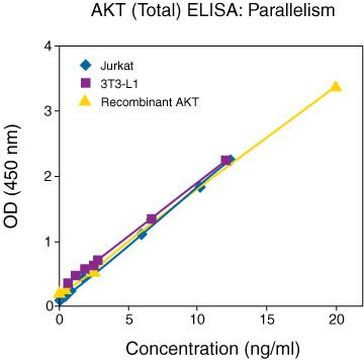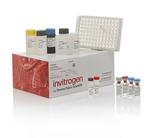Search Thermo Fisher Scientific
Product Specifications
Analytical sensitivity
Assay range
Sample type/volume
Hands-on time
Time-to-result
Homogenous (no wash)
Interassay CV
Intraassay CV
Instrument
Product size
Contents
Standard
Standard Dilution Buffer
Detection Antibody
anti-rabbit-HRP
HRP Diluent
Wash Buffer
Chromogen
Stop Solution
Adhesive Plate Covers
Shipping conditions
Storage
Protein name
Target sub-specificity
Protein subtype
Protein family
Species (tested)
Assay kit format
Detector antibody conjugate
Label or dye
About This Kit
The Human AKT (Total) ELISA Kit is a solid-phase sandwich Enzyme-Linked Immunosorbent Assay (ELISA) designed to detect and quantify the level of AKT (Total) in fresh or frozen human cell lysates. Cross-reactivity in mouse and rat cell lysates has been observed. The assay recognizes both natural and recombinant AKT (Total), independent of its phosphorylation state.
Principle of the method
A monoclonal capture antibody specific for AKT (Total) has been coated onto the wells of the 96-well plate. During the first incubation, standards of known content and unknown samples are pipetted into the wells and the antigen binds to the immobilized (capture) antibody. After washing, a rabbit antibody specific for the target protein is added to the wells and serves as a detection antibody by binding to the immobilized protein captured during the first incubation. After washing, a horseradish peroxidase labeled anti-rabbit IgG is added. This binds to the detection antibody to complete the four member sandwich. After a third incubation and washing to remove all the unbound enzyme, a substrate solution (TMB) is added, which is acted upon by the bound enzyme to produce color. The intensity of this colored product is directly proportional to the concentration of target protein present in the original specimen and the optical density can be read on a standard microplate reader.
Rigorous validation
Each manufactured lot of this ELISA kit is quality tested for criteria such as sensitivity, specificity, precision, and lot-to-lot consistency. See manual for more information on validation.
AKT also known as protein kinase B (PKB) or RAS-alpha, is an ubiquitous serine/threonine kinase that plays an important role in diverse biological responses such as regulation of metabolism, cell survival and growth by phosphorylating multiple proteins. This protein kinase is activated by insulin, PI3K, IGF1 and various other growth and survival factors. Akt promotes cell survival by inhibiting apoptosis through phosphorylation and inactivation of several targets, including forkhead transcription factors, and caspase-9. The AKT pathway is a major target for cancer drug discovery.
For Research Use Only. Not for use in diagnostic procedures. Not for resale without express authorization.
Bioinformatics
Gene aliases : 2410016A19Rik, AI851531, AKT, AKT1, AKT2, AKT3, AW554154, CWS6, D930002M15Rik, HIHGHH, MPPH, MPPH2, Nmf350, PKB, PKB-ALPHA, PKB-GAMMA, PKB/Akt, PKBalpha, PKBB, PKBBETA, PKBG, PRKBA, PRKBB, PRKBG, RAC, RAC-ALPHA, RAC-BETA, RAC-gamma, RAC-PK-gamma, STK-2
Gene ID : (Human) 207, (Human) 208, (Human) 10000, (Mouse) 11651, (Rat) 24185, (Rat) 25233, (Mouse) 11652, (Rat) 29414, (Mouse) 23797
Gene symbol : AKT1, AKT2, AKT3, Akt1, Akt1, Akt2, Akt2, Akt3, Akt3
Protein Aliases : AKT1 kinase, AKT1m, Akt1m protein, AKT2 kinase, AKT3 kinase, murine thymoma viral (v-akt) homolog-2, murine thymoma viral (v-akt) oncogene homolog 1, murine thymoma viral (v-akt) oncogene homolog 2, PKB, PKB alpha, PKB beta, PKB gamma, Protein kinase Akt-2, Protein kinase Akt-3, Protein kinase B, Protein kinase B alpha, Protein kinase B beta, Protein kinase B gamma, protein kinase B, beta, gamma, protein kinase B-alpha, Proto-oncogene c-Akt, putative v-akt murine thymoma viral oncoprotein 2, rac protein kinase alpha, RAC protein kinase alpha RAC-PK alpha, RAC protein kinase beta, RAC protein kinase beta RAC-PK beta, RAC-alpha serine/threonine-protein kinase, RAC-beta serine/threonine protein kinase, RAC-beta serine/threonine-protein kinase, RAC-gamma serine/threonine protein kinase, RAC-gamma serine/threonine-protein kinase, RAC-PK-alpha, RAC-PK-beta, RAC-PK-gamma, related to A and C kinases, serine-threonine protein kinase, STK-2, Thymoma viral proto-oncogene, thymoma viral proto-oncogene 1, thymoma viral proto-oncogene 2, thymoma viral proto-oncogene 3, v-akt murine thymoma viral oncogene 3, v-akt murine thymoma viral oncogene homolog 1, v-akt murine thymoma viral oncogene homolog 2, v-akt murine thymoma viral oncogene homolog 3 (protein kinase B, gamma), v-akt murine thymoma viral oncogene-like protein 1

Performance Guarantee
If an Invitrogen™ antibody doesn't perform as described on our website or datasheet,we'll replace the product at no cost to you, or provide you with a credit for a future purchase.*
Learn more
We're here to help
Get expert recommendations for common problems or connect directly with an on staff expert for technical assistance related to applications, equipment and general product use.
Contact tech support



